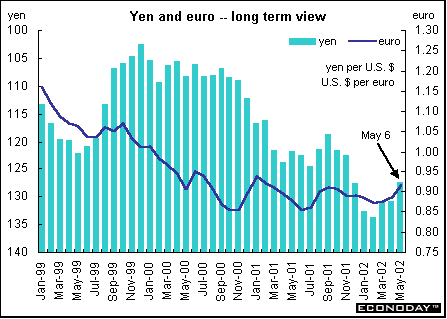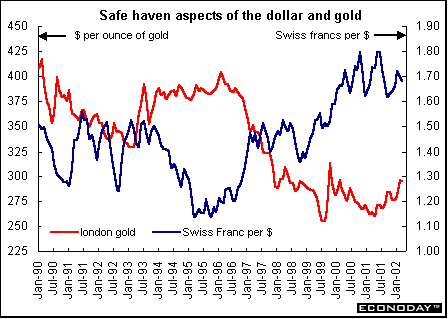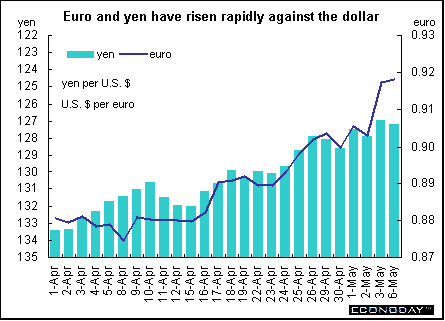Forecasting foreign exchange rates is a high wire act. Conventional logic does not always apply. Take the dollar for example. Despite a U.S. economy that is outperforming just about everyone in the global village, the dollar is falling in value. Even though last week's congressional testimony by Treasury Secretary Paul O'Neill was dollar-positive, market players parsed his remarks and found an excuse to sell. Yet throughout all the gyrations in global financial markets since the mid-1990s, the dollar has been a beacon of strength for investors. Except for brief setbacks in 1998 and 1999, the currency has appreciated steadily over the past seven years. Not so far this year, as the dollar has failed to advance against the euro and yen despite a better U.S. performance than Japan or the eurozone. It also has depreciated against the commodity-based currencies of Norway, Australia, New Zealand, and Canada.

The strength of the dollar is based on the U.S.'s record growth and vigorous equities and capital markets compared with other major countries. What isn't helping the dollar now is that both equity and foreign exchange market players seem to be at the stage where they sell the dollar no matter the news.
Since the middle of the 1990s, the United States has had a strong, unequivocally strong dollar policy. However, since President Bush took office traders have continually tested the administration's commitment to the strong dollar. As recently as last week, Treasury Secretary O'Neill failed to evoke the mantra used by his predecessors, and the dollar fell sharply. After numerous years of strength, the dollar has begun to show signs of vulnerability.
Current account deficit
Even though many in the United States pay little attention to the current account deficit (including Secretary O'Neill), those in the international markets do. The current account deficit is a measure of how much is spent on imported goods and services versus how much is received in net investment income in return. The rising current account deficit, as it absorbs a greater percentage of gross domestic product, has caught the attention of foreign exchange traders who believe it is a dollar-negative. Currency traders see it as a warning signal and question the ability of the United States to continue to attract the investment flows needed to support the nation's import habit, especially given the less-than-spectacular performance of U.S. corporate profits.
Most economists take a more balanced approach to the current account deficit, acknowledging that strong demand has pushed it higher. The rising dollar has led to an avalanche of cheaper imports, which ultimately have to be paid for. And the United States has been able to attract investment flows into its stocks, bonds, property and government securities that have pretty much offset this increased trade deficit.
Safe haven
The dollar traditionally has provided a safe haven to investors in times of political uncertainty. This has been true especially during the periodic crises in the Middle East. Gold, though stuck in a long decline, has also been a traditional store of value. But due to the dollar's decline, gold has been rising steadily. The Swiss franc also has emerged as a safe haven despite the Swiss National Bank's efforts to discourage its rise in value, especially against the euro. But when things go awry, investors flock to what looks safest at the moment.

The dollar's impact
The higher dollar of past years eased inflationary pressures and opened the door for the Fed to lower interest rates. But as growth in the economy picks up, increased demand could push up prices on domestic goods. This, combined with a lower dollar, would raise prices on imported goods, heightening inflationary prospects and making the Fed less likely to keep interest rates at their current low level.

But a weakening dollar has pluses too. It helps fatten profits of U.S. multinationals by making their prices, compared with more expensive imports, more competitive both at home and abroad. And if you own a mutual fund that invests abroad, a weak dollar boosts your returns - simply because they translate into more dollars. The prospect of a continuing dollar drop is one reason it is smart for U.S. investors to think globally now. Some industry groups have been pushing for a change in dollar policy - one that would lower the dollar and perk up depressed sales overseas and domestically as well.
BOTTOM LINE
Punishing the dollar for lower-than-expected U.S. growth is a two-edged sword, especially since virtually everyone is banking on the United States to propel their recoveries. Inside the U.S., a lower dollar would enhance domestic expenditures. It would redirect money spent abroad back to U.S. production, although gains would be offset in part by the higher prices paid for more expensive imports.
Outside the U.S. the effects are much more challenging. The lower dollar would raise prices of exports and make them less competitive inside the U.S. The main losers would be those countries, most notably Japan, that have relied on exports for their domestic economic growth. The eurozone, with its equally lackluster level of consumer demand, has almost as much to worry about. The advantages of reduced inflation would not offset the fall in demand from the United States.
What does all this mean for investors? Investors shouldn't worry too much about the dollar when forming a wide long-term investing strategy. However, a weak currency could help ease depressed corporate earnings, especially for those companies with a large international presence. For years, a strong dollar pulled in lots of imports to the United States. But now, with less competition from higher-costing imports, U.S. companies could lift output and prices.
The likeliest scenario is that investors will continue to find the United States a relatively attractive place to be, although possibly at lower levels than in the past. This, combined with the traditional propensity of Americans to buy more from foreigners than they can sell to them, means that the dollar could weaken. But a severe drop just doesn't seem likely.
Anne D. Picker,
International Economist, Econoday
| 